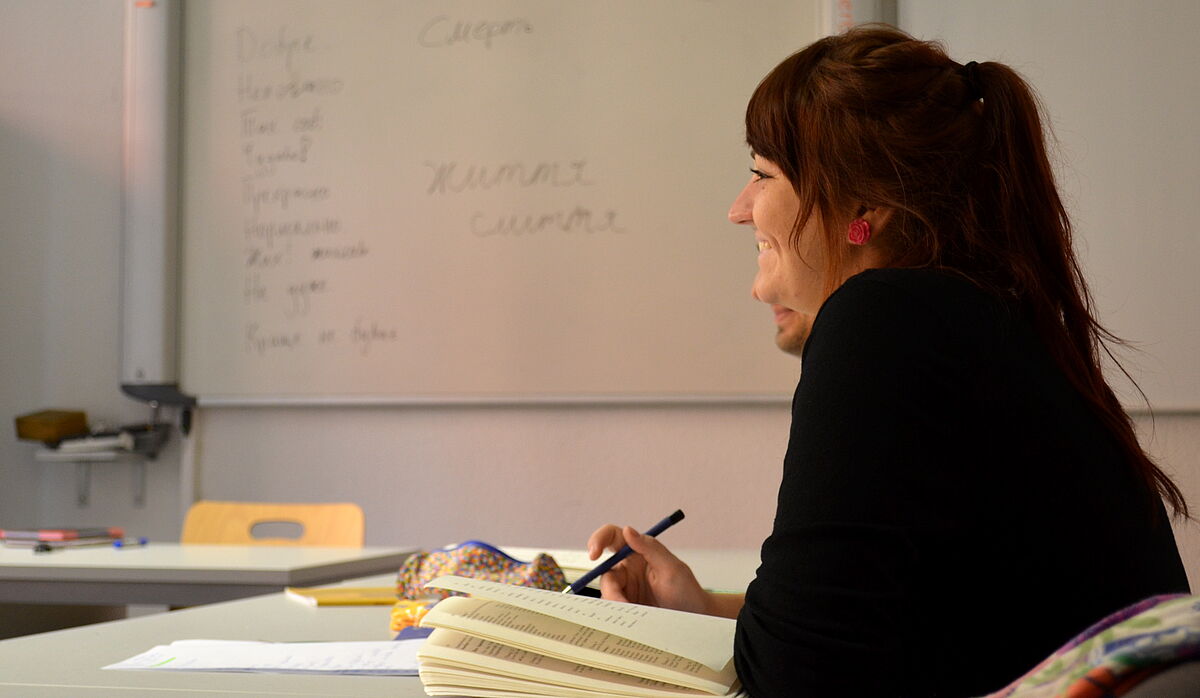The Department of Slavonic Studies at the Faculty of Arts and Humanities is divided into three chairs that cover three different disciplines: Slavonic Linguistics (n.n.), Slavonic Literary Studies (Prof. Dr. Andreas Ohme), Ukrainian Cultural Studies (Prof. Dr. Roman Dubasevych)
The subject and the courses on offer
Slavonic Studies in Greifswald sees itself as a comparative discipline. In Greifswald, it is understood as a subject that researches the history and development of Slavonic literatures and languages in the context of cultural relations. Due to Greifswald's geographical proximity to Poland, Russia and Ukraine, research and teaching focus on the languages and literatures of these three countries. The Department of Slavonic Studies is involved in both individual and interdisciplinary projects in the university's research domain ‘Baltic Sea Region’.
Teaching and studies
The degree courses on offer are Bachelor of Arts Slavonic Studies, Teacher-Teaching Degree for Gymnasium(training to become teachers of Polish and Russian at secondary schools up to year 12), Teacher-Training Degree for Regionale Schule (training to become teachers of Polish and Russian at secondary schools up to year 10) and Teacher-Training Degree for Primary Education (training to become primary school teachers of Polish [de]).
German and Mathematics are compulsory for all Primary Education students. It is recommended that all students take Sachunterricht as their third subject (Polish can be chosen as an alternative).
An optional subsidiary subject can be chosen for the Teacher-Training Degrees for Gymnasium and Regionale Schule. This is studied to a lesser extent than the other subjects - therefore a subsidiary subject can only be taught at lower secondary level and only with the approval of the responsible school authority. In principle, subsidiary subjects cannot be taught at upper secondary level. The subsidiary subjects can be chosen freely. The subsidiary subject "Bilingual teaching and learning" [de] is new as of winter semester 2020/2021. The aim of the new subsidiary subject is to prepare students on teacher-training degrees for bilingual subject teaching at international schools, European schools, grammar schools, comprehensive schools and secondary schools.
The languages taught are Polish, Russian, Czech and Ukrainian.
The subject Slavonic Studies imparts knowledge of Slavonic literatures, languages and cultures as well as methods for their research. The aim of the course is for students on bachelor's and teacher-training degree courses to acquire a general methodological competence in the academic processing of tasks in the field of Slavonic Studies and the ability or, in particular for teacher-training students, the teaching theory and skills to convey the special features of Slavonic languages, literatures and cultures to a group of speakers of other languages.
Study specialisations
In addition to the regular linguistic and literary seminars based around the individual Slavonic languages, which use examples to illustrate questions and methods of linguistics and literary studies, we also offer general comparative classes for the Slavonic languages. Furthermore, there are regular lectures on the history of national Slavonic literatures and classes on regional and cultural studies of the individual countries.
Contact
Slavonic Literary Studies
Prof. Dr. Andreas Ohme
Office: Manuela Schlünß
Ernst-Lohmeyer-Platz 3
17489 Greifswald
Tel.: +49 3834 420 3230
slawistuni-greifswaldde
Slavonic Linguistics
n.n.
Office: Manuela Schlünß
Ernst-Lohmeyer-Platz 3
17489 Greifswald
Tel.: +49 3834 420 3230
slawistuni-greifswaldde
Ukrainian Cultural Studies
Prof. Dr. Roman Dubasevych
Office: Manuela Schlünß
Ernst-Lohmeyer-Platz 3
17489 Greifswald
Tel.: +49 3834 420 3230
slawistuni-greifswaldde

